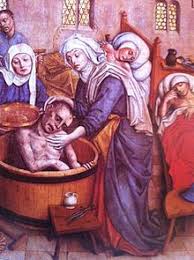HOMILY WEEK 13 02 – Year I
A Seismic Revelation of God:
Optional memorial of St. Elizebeth of Hungary
(Gen 19:15-29; Ps 26; Mt 8:23-27)
**************************************
“What sort of man is this?”
The Word Among Us offers us some insights into the answer to the question, inviting us to grow in our appreciation of who Jesus truly is.
In today’s Gospel, Jesus and his disciples get caught in a storm at sea. Not just a little cloudburst, mind you, but a “violent storm” (Matthew 8:24). The word Matthew uses to describe the storm comes from the Greek seismos, literally, “earthquake.
Matthew uses that word seismos four times in his Gospel, and each time, it signals a deeper revelation about the identity of Jesus. It’s as if Matthew were saying “Pay attention! God is unveiling something important here!” Let’s see what God is showing us through these “earthquakes.”
In today’s passage, Jesus is fast asleep in the boat amid the tumult while the disciples panic. When they rouse him, it takes only one command to calm the wind and the waves. Matthew is telling us that Jesus is no ordinary rabbi. He is Lord over creation, even when he appears to be asleep. Surely this comforted Matthew’s first-century readers when persecution came their way.
In Matthew 24:7, Jesus describes his Second Coming by saying that earthquakes will precede it as a sign that he is near. Then, after the earthquake comes the revelation: all humankind “will see the Son of Man coming upon the clouds of heaven” (24:30). Here God reveals that Jesus is the powerful Son of Man (Daniel 7:13), the Lord who will reign over all of history.
Matthew’s next reference to an earthquake occurs during Jesus’ passion at his death. In chapter 27, when Jesus gave up his spirit, “the earth quaked, rocks were split, tombs were opened, and the bodies of many saints who had fallen asleep were raised” (27:51-52). This time the revelation comes through the Roman centurion and his men: “When they saw the earthquake, they said, ‘Truly, this was the Son of God!’” (27:54).
Matthew’s final earthquake occurs at Jesus’ resurrection: “There was a great earthquake; for an angel of the Lord descended from heaven, approached, rolled back the stone and sat upon it” (28:2). What is this revelation? Jesus is risen. He is God, sovereign over death itself.
So – Lord over creation. Lord over history. Victor over death. True Son of God. Surely Jesus can help us in our personal “earthquakes”!

St. Elizabeth of Hungary
The Church today honours someone who lived these teachings in an exemplary manner – St. Elizabeth of Portugal. Born in 1271, she was Daughter of King Peter III of Aragon and named after her great-aunt, St Elizabeth of Hungary. Her birth prompted a reconciliation between her father and grandfather. Thus began her reputation for bringing peace; she came to be called “the Peacemaker.” She was married at age 12 to King Denis of Portugal, by whom she had two children. She set up hospitals, orphanages and other institutions, patiently endured her husband’s infidelities, forgiving him and also providing for the education of his illegitimate children. She also acted as a peacemaker in the quarrelsome and complicated politics of the time. When her son twice led rebellions against his father, she helped them reconcile.
On her husband’s death in 1325 she retired from public life, joined the Poor Clares, giving up her rank and wealth for a life of simplicity, devoting herself to prayer and the service of the poor. Throughout her life she was faithful and regular in prayer and daily prayed the Liturgy of the Hours, way ahead of her time.
In 1336 she successfully settled a conflict between her son, by now King Alfonso IV of Portugal, and her grandson, King Alfonso XI of Castile. Elizabeth followed the Portuguese army on the field in an effort to bring about that peace, an effort that led to illness and her death on July 4th, 1336. She is a model of faith, forgiveness, charity, genuine caring for the poor, peacemaking, and prayer. Canonized in 1625, Elizabeth is a patron of Catholic charities.
The Eucharist is our boat for navigating the stormy waters in our lives. The Word of God reaches deep into our spirits with healing balm, and the Body and Blood of Jesus that we receive gives us a taste of eternal life here and now.
May our celebration deepen our faith in our God who is humility, mercy, compassion, forgiveness, unconditional love and above all, totally non-violent. May it empower us to live in harmony with God and in peace with others, as we journey with Jesus in our boats over any troubled waters of our lives.



